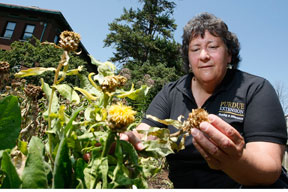Drought could limit garden plants' development next year
June 28, 2012
 |
|
Even in a well-maintained garden, plants can show signs of heat stress. Purdue Extension consumer horticulturist Rosie Lerner displays an Armenian basket flower that is struggling in the Purdue Horticulture Garden. (Purdue Agricultural Communication photo/Tom Campbell) |
WEST LAFAYETTE, Ind. - As if home gardeners don't have their hands full just trying to keep their plants healthy in this drought and scorching heat, they also need to know this: environmental stress this year could influence how the plants develop next year, Purdue Extension consumer horticulturist Rosie Lerner says.
The columnist who writes the monthly "Purdue Yard & Garden News" also says some gardeners ultimately might have to decide which plants to try to save and which to let go.
"Gardeners have a battle on their hands to keep plants healthy when extremely high temperatures are accompanied by lack of rain," Lerner writes in her June column titled "In Times of Drought."
"Keep in mind that next year's growth will be determined by buds that form this summer and early fall. Flower buds for spring flowering and fruiting plants will also be developing during this time. So the damaged inflicted by drought now may affect next season."
Compounding the problem are any watering restrictions or a gardener's limited ability to water larger numbers of plants.
"You may have to limit watering and prioritize which plants will be rescued - a bit of garden triage, so to speak," Lerner says.
She offers advice in her column to home gardeners trying to keep their flowers, shrubs, trees and vegetables as healthy as possible this summer. Among her tips:
* New plants need 1 to 1 1/2 inches of water per week to maintain optimum flowers foliage, roots and fruits.
"In times of drought, established plants may tolerate 10-14 days between watering," she writes, "but be aware that problems such as fruit cracking and blossom end-rot will increase."
* The best way to water a garden is by soaking the soil thoroughly - but slowly - in one application.
"This slow, deep watering will encourage deeper root growth, which in turn will be better able to withstand drought," she says. "Frequent shallow water encourages shallow roots, which are more likely to succumb to heat and drying of the topsoil."
* Household "gray water" - such as that leftover from a bath or washing dishes - can be used but with caution.
"Gray water could have a high level of detergent salts, which can eventually build up to harmful levels in the soil," Lerner writes.
Water from a water softener has a high level of sodium that can tighten soil, preventing water from passing through it.
"Use gray water only as a last resort, and use it as sparingly as possible to avoid salt buildup," she says.
Lerner says gray water should never be used to irrigate edible crops or on plants in containers because of health risks associated with it.
Lerner's full column with additional tips is available at http://www.agriculture.purdue.edu/agcomm/newscolumns/archives/YGnews/2012/June/120621YG.html
Lerner also writes the monthly column "In the Grow," offering gardening tips in a question-and-answer format. That and other Purdue Extension news columns are available at https://ag.purdue.edu/agcomm/Pages/Newscolumns.aspx
Writer: Keith Robinson, 765-494-2722, robins89@purdue.edu
Source: Rosie Lerner, 765-494-1311, rosie@purdue.edu
Note to online editors: A link to a video clip of Purdue Extension consumer horticulturalist Rosie Lerner offering advice to homeowners on how to take care of their gardens during drought is at the bottom of this news release. The video can be embedded in your website.
Video:
A link to a video clip of Purdue Extension consumer horticulturalist Rosie Lerner offering advice to homeowners on how to take care of their gardens is available at http://youtu.be/3cdSupYgnhc
The embed code is:
<iframe width="420" height="315" src="http://www.youtube.com/embed/3cdSupYgnhc" frameborder="0" allowfullscreen></iframe>
Ag Communications: (765) 494-2722;
Keith Robinson, robins89@purdue.edu
Agriculture News Page

